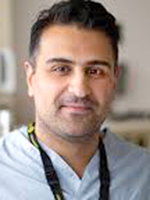
Congratulations to this year’s recipients of the Vancouver Coastal Health Research Institute Investigator Awards.
One of the many ways in which Vancouver Coastal Health Research Institute (VCHRI) fulfills its mandate to support and promote excellence in health research is through its annual Investigator Awards competition, The peer-reviewed salary support awards allow investigators at Vancouver General Hospital (VGH), UBC Hospital, and G.F. Strong Rehabilitation Centre to reduce their clinical practice commitments and build their research capacity to expand the possibilities of bringing knowledge from bench to bedside. The awards are supported by VGH & UBC Hospital Foundation, Vancouver Acute (VA) Medical, Dental and Allied Staff Association and VCHRI.
The 2016 VCHRI Investigator Award recipients are:
- Dr. David Schaeffer, Assistant Professor, Department of Pathology and Laboratory Medicine, Faculty of Medicine, UBC; Consultant Pathologist, Pancreas Centre BC
- Dr. Mypinder Sekhon, Clinical Assistant Professor, Department of Medicine, Division of Critical Care Medicine, Faculty of Medicine, UBC; Staff Intensivist, VGH Intensive Care Unit
- Dr. Marie Westby, Clinical Associate Professor, Department of Physical Therapy, Faculty of Medicine, University of British Columbia (UBC); Associate Research Member, Centre for Hip Health and Mobility; Physical Therapy Teaching Supervisor, Department of Physical Therapy, Mary Pack Arthritis Program
Congratulations to this year’s recipients!
Pancreatic cancer kills 5,000 Canadians each year and its incidence rates are rising. Despite decades of research, the five-year survival rate is a dismal six per cent. And if progress isn’t made to improve outcomes, the annual number of deaths is anticipated to double by 2030.
“The poor outcome in pancreatic cancer is compounded by the fact that clinicians have no clear guidance on which available treatment option would work best for individual patients,” explains Dr. David Schaeffer. “Cancer treatment does not benefit from the ‘one size fits all’ approach because individual tumours, even if originating in the same organ, have different biological signatures that can affect their response to treatment.”
Tumour subtyping – a method by which scientists categorize the unique characteristics of individual tumours – has facilitated precision medicine in lung and breast cancers but has not yet identified pancreatic cancer subtypes that could direct treatment.
Dr. Schaeffer’s study aims to detect clinically meaningful pancreatic tumour subtypes and study their impact on patients’ survival rates and response to treatment.
“We will perform detailed molecular analysis of patient tumours and blood samples to investigate their distinct biological signatures,” he explains. “In addition to comprehensive genetic analysis of individual tumours removed from patients, we aim to discover sets of specific protein markers that can be easily detected in tumours removed from patients, as part of an economically feasible standard clinical assessment to predict the individual response to treatment.”
Dr. Schaeffer’s study findings will have the potential to be rapidly translated into immediate impacts on treatment selection for each patient.
The brain is critically dependent on a constant blood flow to supply oxygen. In normal health, the blood flow to the brain is kept constant throughout a wide range of blood pressure. When blood pressure drops, the blood vessels to the brain enlarge to encourage flow. In contrast, with elevated blood pressure, the blood vessels constrict, to prevent too much blood flow, which itself may be damaging to the brain. The ability of the brain to maintain constant blood flow across a wide range of blood pressures is termed 'autoregulation'. In the first few days following cardiac arrest, the brain's ability to autoregulate is severely compromised making it exquisitely sensitive to both low and high blood pressure. Although guidelines exist to maintain a 'reasonable' blood pressure following cardiac arrest, these do not take into account the patient's own specific autoregulatory threshold.
Near infrared spectroscopy (NIRS) is a technology that measures the oxygen content and flow of blood to the brain. Software exists that calculates the change in NIRS in response to changes in a patient’s own blood pressure.
"This software precisely identifies the optimal blood pressure that each patient must have to ensure adequate delivery of oxygen," explains Dr. Sekhon. "We will perform a prospective multicentre pilot study to evaluate our ability to determine the optimal blood pressure using NIRS in patients following cardiac arrest and hypoxic-ischemic brain injury."
"In addition, we want to examine if the optimal blood pressure determined from NIRS differs from the patient's actual blood pressure. We'll use results from this study to inform a pilot randomized trial comparing optimal blood pressure management to standard of care."
Every year, more than 100,000 Canadians – including 12,000 British Columbians – have a total hip or knee replacement to treat the pain and loss of day-to-day function in the joints. However, about one in five people will continue to have marked pain and reduced walking ability many years later. The lack of consistency in the rehabilitation and care patients receive before and after surgery may explain some of the differences in outcomes.
To address these gaps and inconsistencies, Dr. Marie Westby developed quality indicators (QIs) for joint replacement rehabilitation, statements about the minimum level of care a person can expect to receive. Her research will aim to develop and evaluate targeted, multi-faceted QI implementation strategies for clinicians’ behaviours (QI adherence) and patient outcomes and experiences after surgery.
“When QIs are available to use with patients during care, clinicians can use them to guide their treatment plan, assess the effectiveness of the treatment and compare different treatment approaches to determine what is most effective,” says Dr. Westby. “For our study, we plan on developing a toolkit of resources including online and print materials to help clinicians use these multi-faceted indicators in practice. And to make these QIs useful to patients and their families, we will also create another toolkit of patient-friendly resources including checklists embedded in the provincial hip and knee replacement educational booklet. Patients can use these QI tools to make decisions about their own rehabilitation care, engage with their health professionals in the preparation for and recovery from surgery, and monitor the quality of care they received.”





